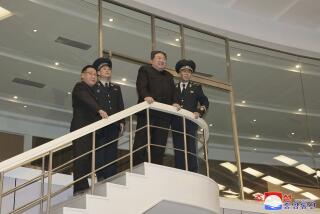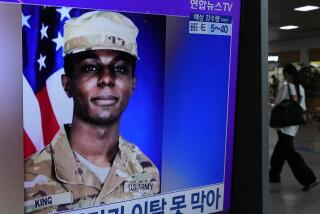U.S. Apologizes to N. Korea for Copter Incident
- Share via
SEOUL — The United States has sent a letter to North Korea expressing regret for violating its airspace eight days ago when a U.S. Army helicopter mistakenly crossed into the Communist nation’s territory and was shot down, U.S. officials here and in Washington said Saturday.
Pentagon officials were optimistic that the letter would ease the way for North Korea to release the helicopter’s surviving pilot, Chief Warrant Officer Bobby Hall. Pyongyang had demanded an apology, and U.S. officials said the letter would help the nation save face and make it politically easier to release the soldier.
“We’re sitting on our hands. We’re hopeful he’ll be back during daylight time tomorrow,” a Pentagon official said Saturday. But Hall remained in the hands of the North Korean People’s Army as Christmas morning arrived in Asia.
The letter uses the word regret , the official said. It “attributed the flight (over North Korean territory) to navigation error.”
“It does convey assurances the U.N. command is taking steps to prevent a recurrence,” the official said.
U.S. troops in South Korea are officially under the command of the United Nations, as they have been since the start of the Korean War more than 40 years ago.
The letter was written by Gen. Gary E. Luck, supreme commander of the 37,000 U.S. troops in South Korea, and was reviewed by Defense Secretary William J. Perry and other senior Clinton Administration officials, a senior Pentagon source said.
President Clinton, meanwhile, said Saturday in his weekly radio address that he was “hopeful” that Hall “will soon be back with his family.”
North Korea has said that Hall is in good condition, but there has been no outside contact with him. He and his co-pilot, Chief Warrant Officer David Hilemon, were shot down when their unarmed OH-58 helicopter, on a rainy flight, strayed over North Korean territory Dec. 17.
Hilemon died in the crash. After several days of negotiations by Rep. Bill Richardson (D-N.M.), who happened to be visiting Pyongyang, his body was turned over to U.S. soldiers Thursday in a brief ceremony at the truce village of Panmunjom in the demilitarized zone between North and South Korea.
*
“Our thoughts--Hillary’s and mine, and I know all of America’s--are with the family of Chief Warrant Officer Hilemon. . . . We are pleased that his remains have been returned to his family,” Clinton said.
While the President expressed hope that Hall, 28, would be returned quickly, and other aides said they had what one said was “a pretty good idea” of what North Korea wanted, one senior Pentagon official indicated that the U.S. government was uncertain whether the North Korean military and other government officials there were acting in concert.
“What we don’t know is if everybody in North Korea wants the same thing, and if a letter for one constituency serves another constituency,” said the Pentagon official, speaking on condition of anonymity.
The incident marked the first time in 17 years that a U.S. aircraft has been shot down over North Korea, and U.S. officials have anxiously tried to make contact with their counterparts from Pyongyang “wherever we can find them,” the official said.
The U.S. government officials have apparently been stymied not only by the secretive manner in which the North Koreans operate but by their failure to make clear just what steps could have resolved the dispute quickly.
Expressing this frustration, the official said: “If we knew exactly what was required, we’d have done it some time ago.”
The official said the three-paragraph letter was prepared for delivery to the supreme command of the North Korean army and that he was “99% sure it was delivered.” A White House official said he believed the letter was to have been delivered Saturday, at a meeting between U.S. and North Korean officials.
Richardson said the United States was giving information to North Korea that would allow the North Koreans “to save face, say they have all the information relating to the accident, be convinced that it was not an intelligence mission.”
Richardson said the letter attributed the helicopter’s route to a map-reading error.
Throughout the day, the letter prompted considerable confusion, both here and in Washington, where offices generally were empty as Christmas approached.
Officials pointed out that the letter says no more than Perry had said twice in the previous week, once when he expressed regrets and again when he said the intrusion over North Korea had been a “mistake.”
In addition, officials were uncertain what steps would follow and when the two sides would meet again.
But, with negotiations over Hall’s fate said to be at a critical and delicate stage, officials here adopted a low-key tone.
Under the most optimistic scenario, and one that was not being ruled out, it was possible that U.S. and North Korean generals might schedule a meeting early today at Panmunjom and agree on releasing Hall in the afternoon.
*
That would bring an end to a week of tension that has threatened to jeopardize the new, more cordial relationship taking hold between Washington and Pyongyang and, in particular, to derail a recently concluded nuclear pact.
Under an agreement reached in October, North Korea pledged eventually to dismantle its nuclear weapons program, while the United States promised to arrange for two alternative nuclear reactors that will provide energy and to begin the process of normalizing relations.
Watanabe reported from Seoul and Gerstenzang from Washington.
More to Read
Sign up for Essential California
The most important California stories and recommendations in your inbox every morning.
You may occasionally receive promotional content from the Los Angeles Times.











